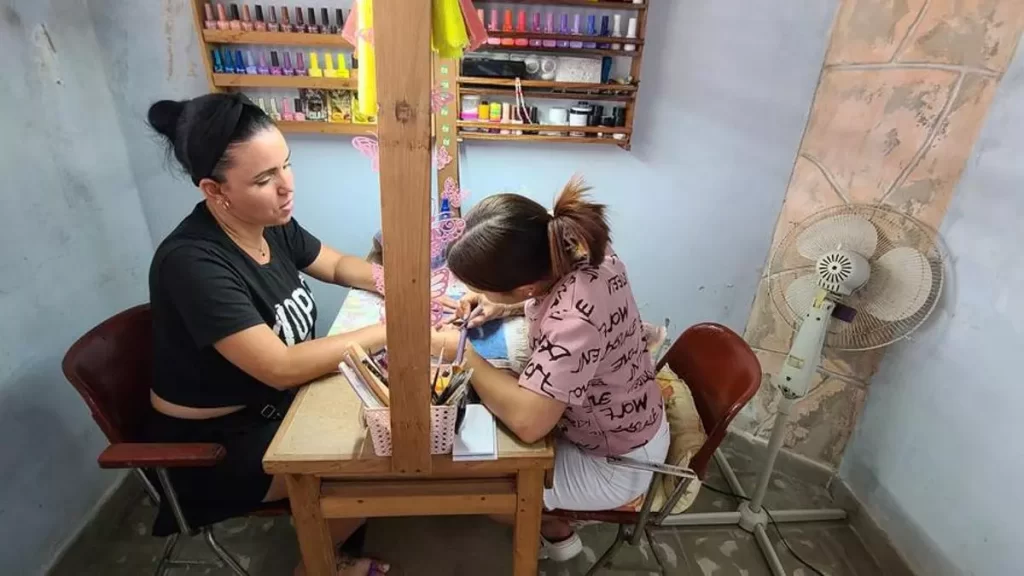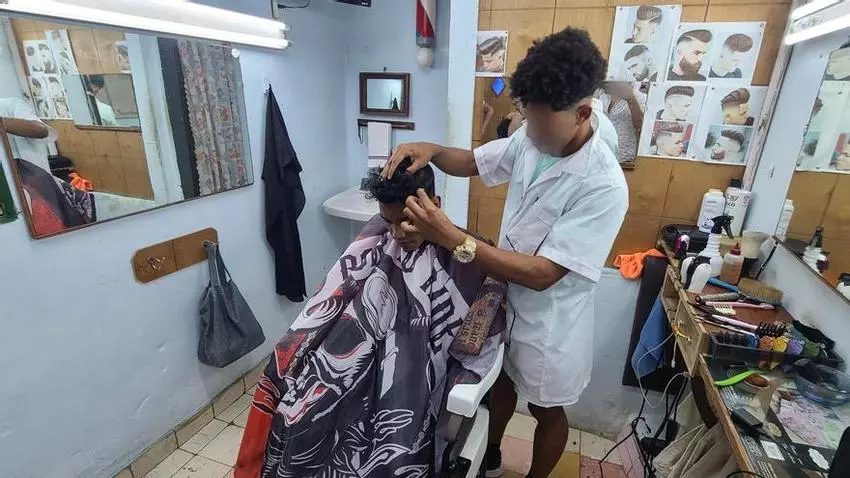Ana and Jairo have several jobs that allow them to get by. They have no plans to leave the country

![]() 14ymedio, Pedro Espinosa, Havana, 28 April 2024 — From pink to lilac nail polish, from glitter to acetone and solvents, the supplies that Ana uses in her manicure business are well-organized along one wall. A lamp, a fan and a modest work table make up the rest of her equipment. Her husband Jairo is an employee at a government warehouse and cuts hair on the side. Both also manage and deliver food orders that have been purchased online by customers living abroad.Ana makes between 10,000 and 12,000 pesos a month. Jairo, about 2,500 from his job at a warehouse and whatever he can earn as a delivery driver. They have no children. They have no plans — at least no obvious ones — to leave Cuba. “And even then it’s not enough for us,” they say.
14ymedio, Pedro Espinosa, Havana, 28 April 2024 — From pink to lilac nail polish, from glitter to acetone and solvents, the supplies that Ana uses in her manicure business are well-organized along one wall. A lamp, a fan and a modest work table make up the rest of her equipment. Her husband Jairo is an employee at a government warehouse and cuts hair on the side. Both also manage and deliver food orders that have been purchased online by customers living abroad.Ana makes between 10,000 and 12,000 pesos a month. Jairo, about 2,500 from his job at a warehouse and whatever he can earn as a delivery driver. They have no children. They have no plans — at least no obvious ones — to leave Cuba. “And even then it’s not enough for us,” they say.
The current migratory stampede has made leaving Cuba a priority for young people. Any way out, from the U.S. “Humanitarian Parole” program or to closer destinations such as the Dominican Republic, will do. However, those who do not have the resources or cannot afford such a trip must stay behind, often to take care of family members. Many young couples aim a little higher. For them, just surviving is not enough. They want to live.
It is a solid structure, what is referred to as “a capitalist house” because it was built before 1959
The house where Ana and Jairo live is in Havana’s Guanabacoa district. It used to belong to Jairo’s grandmother, who moved in with other family members so that the young couple could have some privacy. “Thanks to her, we have a place to live,” says Jairo. It is a solid structure, what is referred to as “a capitalist house” because it was built before 1959.
From here, telephone in hand, Ana processes orders from an online sales platform three days a week for 6,000 pesos. “I distribute what they send me. I get orders for combos and individual items. I have to arrange to have them delivered which, given the fuel situation, is very difficult.”
Ana is also studying for a bachelor’s degree in Hygiene and Epidemiology at the University of Havana, attending classes once a week. “My little jobs have given me the money to pay for car fare to the university,” she says.
The “little jobs” are what the couple needs to keep the operations of the manicure business and other ventures up and running. “Everything comes from overseas,” says Ana, pointing t0 the nail polish, tweezers and nail clippers. “I buy it directly from a customer. Otherwise, it would all be very expensive.”
“Everything comes from overseas,” says Ana, pointing t0 the nail polish, tweezers and nail clippers
“I only see two customers a day. I’m a little slow,” she says. “The other work — the online orders — I do on Friday, Saturday and Sunday. On those days, I also see customers and make phone calls. There’s no time to waste.” In the evening, she prepares dinner and the next day’s lunch.
Jairo managed to work his way into the food delivery business. If not for the money from that, his earnings would be, he notes sadly, “the basic wage in Cuba.” Thanks to the country’s high inflation rate and cost of living, that 2,500 pesos buys almost “nothing.” He says food and clothing are “not a problem” thanks to his family. Despite being large and aging, they often lend the young couple a hand.
Vacations? “You have to plan them well in advance. If I’m going shell out 10,000 pesos on a trip, I’d rather spend it on food,” reasons Jairo. Ana’s 18-year-old brother Jorge often drops by their house in Guanabacoa. Though he is studying to be a railway mechanic, his “real” job is cutting hair.
“They’re piled one on top of another,” he says of his family members. “Grandmother, great-grandmother, brother, cousin… It pays me enough to live on and to help the family.” His barbershop – a rented cubicle – is as modest as Ana’s “studio.” He charges 500 pesos for a head shave, 150 to trim a beard, 350 to do both but with a “special rate for special clients.” He sees five to ten customers a day. “Like everything, there are good days and bad days.”

Several weeks ago, “Alma Mater,” the University of Havana’s student magazine, decided to address the topic of “leaving versus staying.” The result was an article based on three hours of discussion at an officially sanctioned forum, La Cafetera, sponsored by the university’s School of Communication. The gathering addressed the most disturbing question: What to do if the decision – or the obligation – is to remain in Cuba?
The impetus for this gathering was the success of the play “No Importa” (It Doesn’t Matter”). At the time the article was written, the production had had seventy performances, all to a full house, a demonstration how pertinent the topic of migration has become. After acknowledging the difficulty of remaining on the island, “Alma Mater” returns to the fold, quoting a character who does not want “his elders or his friends shedding tears” if he went into exile.
Less tearful, Ana and Jairo are not leaving because of the many ties they have to Cuba. It is not sentimentalism or patriotism but a reality so harsh that there is no time to even ask the question that the editors of “Alma Mater” asked themselves.
____________
COLLABORATE WITH OUR WORK: The 14ymedio team is committed to practicing serious journalism that reflects Cuba’s reality in all its depth. Thank you for joining us on this long journey. We invite you to continue supporting us by becoming a member of 14ymedio now. Together we can continue transforming journalism in Cuba.
